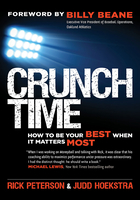
2 Why Reframing at Crunch Time Is Necessary
There is one thing I know. Never ever in history has panic ever solved anything. It’s literally never happened.
— STEVEN SODERBERGH, Palme d’Or winner at the Cannes Film Festival, Academy Award winner for Best Director
Our brains are magnificent and powerful organs with ultra-fast processing speeds. A team of researchers using the fourth fastest supercomputer in the world—the K computer at the Riken research institute in Kobe, Japan—simulated one second of human brain activity. They did so by creating an artificial neural network of 1.73 billion nerve cells connected by 10.4 trillion synapses. While this is impressive, the researchers were not able to simulate the brain’s activity in real time. In fact, it took 40 minutes with the combined muscle of 82,944 processors in the K computer to get just 1 second of biological brain processing time.
In order to operate at this breakneck speed, your brain uses shortcuts. It reflexively assesses a situation and tries to make meaning. One such shortcut is our instinctual fight, flight, or freeze response in the face of a perceived threat. Consider a situation where you are being chased down the street by the neighborhood pit bull. Your brain signals danger. Your brain then floods your body with chemical impulses that tell your body to fight, flee, or freeze. All of this happens in an instant, without your conscious thought.
While our fight, flight, or freeze reflexive reaction serves as valuable protection to physical threats, it’s not relevant when applied to most modern-day pressure situations. Public speaking, for example, is not an imminent threat to your physical safety even though it might feel as if you’re going to die from doing it. But in our mind’s eye, we perceive a pressure situation as a threat or as an opportunity. Viewing pressure as a threat harms our performance. Unfortunately, our reflexive reaction to pressure is threat.
reflexive [ree-flek-siv]
A spontaneous reaction made without conscious thought